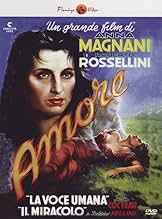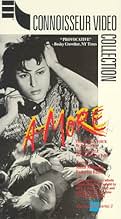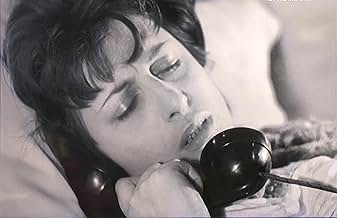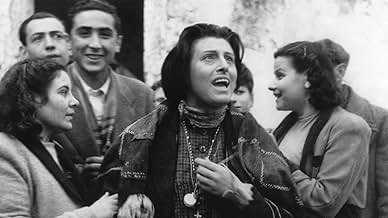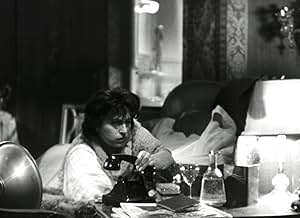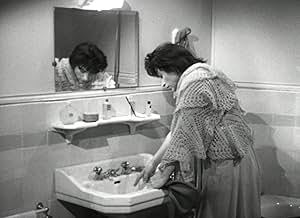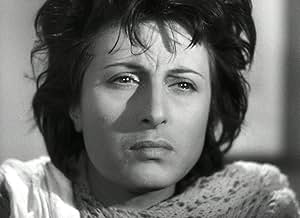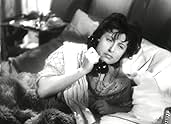CALIFICACIÓN DE IMDb
6.9/10
2.1 k
TU CALIFICACIÓN
Una mujer con el corazón roto habla por teléfono con su examante. Una mujer embarazada cree que San José es el padre del niño.Una mujer con el corazón roto habla por teléfono con su examante. Una mujer embarazada cree que San José es el padre del niño.Una mujer con el corazón roto habla por teléfono con su examante. Una mujer embarazada cree que San José es el padre del niño.
- Dirección
- Guionistas
- Elenco
- Premios
- 2 premios ganados y 2 nominaciones en total
Opiniones destacadas
Long unavailable in its entirety Roberto Rossellini's "L'Amore" remains one of his very greatest films. It is, in fact, two films; the second part, "The Miracle" has been shown separately and ran into censorship problems both in Italy and abroad. Fundamentally, it is a vehicle for Anna Magnani who is quite magnificent. In the first part, Cocteau's monologue "The Human Voice", she is the only person on screen, a lone woman on the telephone to the lover who has left her for another woman. For a good deal of the time Rossellini keeps the camera on that wonderful face and she is heart-breaking.
In the second part she is the deluded peasant seduced, and made pregnant, by none other than Federico Fellini , (who co-wrote the script with Rossellini and Tullio Pinelli). Magnani believes her seducer to be St Jospeh and the baby she is carrying to be some sort of new Messiah, (it was this that so offended the powers that be). Again she is magnificent, (Rossellini dedicated the film 'to the art of Anna Magnani"), in a role totally different from the part she plays in "The Human Voice". It is easy to see how this second part could be released separately from the first, (they are very different in tone), and this small masterpiece is as great a 'short' film as the cinema has given us. Nevertheless, seeing both parts together is testament to the genius of both director and star. Essential.
In the second part she is the deluded peasant seduced, and made pregnant, by none other than Federico Fellini , (who co-wrote the script with Rossellini and Tullio Pinelli). Magnani believes her seducer to be St Jospeh and the baby she is carrying to be some sort of new Messiah, (it was this that so offended the powers that be). Again she is magnificent, (Rossellini dedicated the film 'to the art of Anna Magnani"), in a role totally different from the part she plays in "The Human Voice". It is easy to see how this second part could be released separately from the first, (they are very different in tone), and this small masterpiece is as great a 'short' film as the cinema has given us. Nevertheless, seeing both parts together is testament to the genius of both director and star. Essential.
After the opening credits we see a title that says "This film is an homage to the art of Anna Magnani" and that's exactly what this powerful Rossellini film is about. Magnani dominates both sections of "L'Amore" and is quite remarkable. In the first section which is called "Una Voce Umana"(The Human Voice), Magnani plays a woman in her bedroom who makes a desperate telephone call with her former husband. It is mostly comprised of close-ups of Magnani's grieving face, anticipating those of Rossellini's films starring Ingrid Bergman. In the second section, "Il Maracolo"(The Miracle), Magnani is a peasant who meets and is seduced by a vagabond whom she thinks is Saint Joseph. Though the villagers incessantly ridicule her, she thinks is pregnant with a Christ baby, something that angered the censors and religious groups, ultimately dubbing as "blasphemous". "The Miracle" section is by far the most powerful and provocative". It is characterized by overt Christian symbolism and some gorgeous shots of the countryside. Rossellini makes the viewer aware of the overpowering presence of the environment, itself another character. The scenes where Magnani is lying on the ground surrounded by animals are particularly ravishing and beautiful.
Two short stories about love: the first, based on a Jean Cocteau story, is a powerful sola tour-de-force by the great actress Anna Magnani; it's always hard to pull off an one-set, one-person monologue on the screen successfully, but she does it. The second, based on what can only euphemistically be called a "story" (mostly shots of Magnani walking) by Frederico Fellini, is rambling nonsense; unfortunately, it is also longer than the first episode, and also has nothing really to do with the topic of the title - it does not belong here. *** out of 4 for the first episode, * for the second, ** on average.
Roberto Rossellini freely admitted that the two films that make up this opus were designed as a showcase for the talents of his then partner and muse Anna Magnani. Neither film could be said to have had an easy ride as 'Il Miracolo' was banned in America thanks to that self-appointed guardian of morality, the crackpot Catholic League of Decency whilst 'Voce Umana' was not widely shown because of copyright issues with Jean Cocteau's original play.
Ingmar Bergman once said that the greatest contribution to the art of film is the well lit, well directed and well acted close-up. This is certainly true of 'Voce Umana' in which a woman alone in her apartment is desperately trying to salvage a doomed relationship over the telephone and whose agony is intensified by the phone constantly cutting off. The almost microscopic close-ups here hold no fears for Signora Magnani who is utterly riveting. Although this is a shortened version of Cocteau's original it is no less effective and her intensely emotional performance is aided by Eraldo da Roma's dynamic editing and the use of light and dark by cinematographer Otello Martelli. None of us likes rejection of course but one does feel at times like shouting out 'pull yourself together woman, he's obviously not worth it'.
Most directors never find a muse whereas Rossellini had the good fortune to have not one but two. 'Voce umana' is even more poignant, in retrospect, as he left Magnani two years later for muse#2 Ingrid Bergman. Ironically Miss Bergman was to give a powerhouse performance in a longer version of this piece on American television in 1966.
'Il Miracolo' is quite frankly not as accomplished a film. As in so many of his neo-realist films Rossellini is again playing puppet master to a supporting cast mainly composed of 'real people', that is to say non-professionals who cannot act and who are obviously 'dubbed'. The jury is still out on Fellini's acting abilities! Its rawness and immediacy still pack a punch thanks to Anna Magnani's stupendous portrayal of simpleton Nannina, the camerawork of Aldo Tonti and to another powerful score from Rossellini's brother Renzo.
The true 'miracle' of this piece is that the eventual lifting of its ban, based upon the principle of free expression, marked the beginning of the end for film censorship.
Regarding the wondrous Magnani let us leave the last word to William Dieterle who directed her in 'Volcano' at the same time as Rossellini was directing Bergman in 'Stromboli'. "She was the last of the great, shameless emotionalists."
Ingmar Bergman once said that the greatest contribution to the art of film is the well lit, well directed and well acted close-up. This is certainly true of 'Voce Umana' in which a woman alone in her apartment is desperately trying to salvage a doomed relationship over the telephone and whose agony is intensified by the phone constantly cutting off. The almost microscopic close-ups here hold no fears for Signora Magnani who is utterly riveting. Although this is a shortened version of Cocteau's original it is no less effective and her intensely emotional performance is aided by Eraldo da Roma's dynamic editing and the use of light and dark by cinematographer Otello Martelli. None of us likes rejection of course but one does feel at times like shouting out 'pull yourself together woman, he's obviously not worth it'.
Most directors never find a muse whereas Rossellini had the good fortune to have not one but two. 'Voce umana' is even more poignant, in retrospect, as he left Magnani two years later for muse#2 Ingrid Bergman. Ironically Miss Bergman was to give a powerhouse performance in a longer version of this piece on American television in 1966.
'Il Miracolo' is quite frankly not as accomplished a film. As in so many of his neo-realist films Rossellini is again playing puppet master to a supporting cast mainly composed of 'real people', that is to say non-professionals who cannot act and who are obviously 'dubbed'. The jury is still out on Fellini's acting abilities! Its rawness and immediacy still pack a punch thanks to Anna Magnani's stupendous portrayal of simpleton Nannina, the camerawork of Aldo Tonti and to another powerful score from Rossellini's brother Renzo.
The true 'miracle' of this piece is that the eventual lifting of its ban, based upon the principle of free expression, marked the beginning of the end for film censorship.
Regarding the wondrous Magnani let us leave the last word to William Dieterle who directed her in 'Volcano' at the same time as Rossellini was directing Bergman in 'Stromboli'. "She was the last of the great, shameless emotionalists."
Initially banned in the UK, only the section entitled THE MIRACLE was shown by special permission of the London County Council. Somehow people seem to persist in interpreting the story as a Second Coming narrative, whereas the character played by Anna Magnani only believes she is to bear a "special" child as a reward for her piety. There is not a shred of evidence to suggest she believes she is carrying the Christ-child. Dubbed by the Vatican as "a sacrilegious blasphemy", it is ironic that, as an atheist, the power and emotional intensity of this film brought me the closest I have ever been to what could perhaps be termed a transcendental experience. A masterpiece.
¿Sabías que…?
- TriviaWhen, in 1952, the "Il Miracolo" segment of the film was released in the United States as "The Miracle", it was the subject of a legal battle in which the Supreme Court ruled for the first time that motion pictures, like books and newspapers, were protected under the First Amendment to the Constitution.
- Citas
La donna al telefono (segment "Una voce umana"): What? My black satin dress. Yes, I'm still wearing it. No, I didn't smoke. Just three cigarettes. I swear
- ConexionesEdited into Histoire(s) du cinéma: Une histoire seule (1989)
Selecciones populares
Inicia sesión para calificar y agrega a la lista de videos para obtener recomendaciones personalizadas
- How long is Love?Con tecnología de Alexa
Detalles
- Tiempo de ejecución1 hora 9 minutos
- Color
- Relación de aspecto
- 1.37 : 1
Contribuir a esta página
Sugiere una edición o agrega el contenido que falta

Principales brechas de datos
By what name was L'amore (1948) officially released in Canada in English?
Responda
